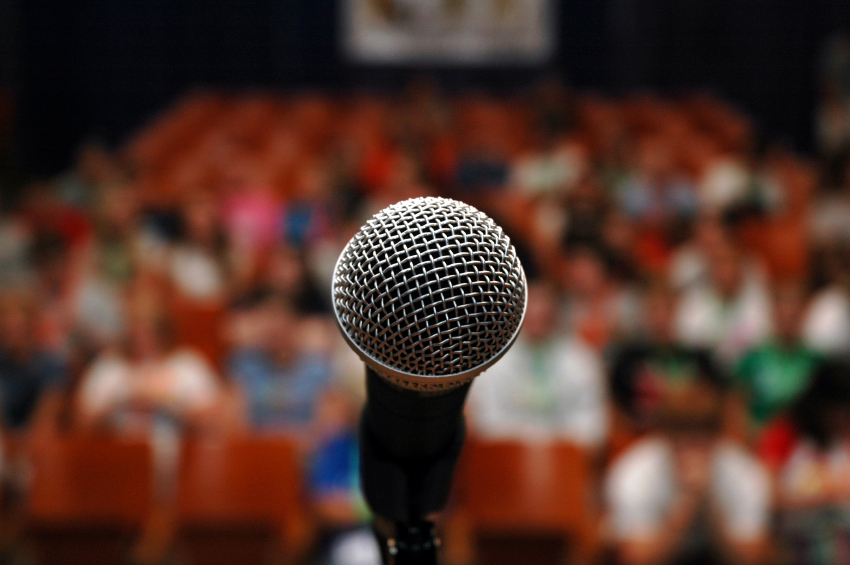Have you thought about becoming a professional speaker–speaking as a way to share your expertise, or your inspiration?
Perhaps you are a Toastmaster and have wondered how being a professional speaker is different than being a Toastmaster. I’ve been a Toastmaster for ten years, and a professional speaker for two.
Here are the top 10 differences I’ve noticed:
1. Money. Professional speakers are paid to speak (duh!). They are contractually obligated to provide value.
2. Business. Professional speakers run a business related to their speaking. Most professional speakers don’t have much staff, so they have to develop content, distribute content (e.g.,website, books, articles, blogs, video, social media), market and sell, in addition to preparing for presentations. And, unless you are a well-known expert in a niche topic, or a celebrity, getting speaking engagements is not easy. Speakers bureaus won’t pay much attention to you when you are just starting out, so you’ve got to get your own gigs.
3. Focus. Professional speakers have to focus on the client/audience, while Toastmasters focus on self-improvement. Every Toastmasters club shares the same mission: We provide a supportive and positive learning experience in which members are empowered to develop communication and leadership skills, resulting in greater self-confidence and personal growth.
A minor related difference relates to the practice of saying “thank you” at the end of the speech. I’ve heard Toastmasters say that you shouldn’t say “thank you” at the end of your speech (“Your audience should thank you”). However, most professional speakers do say “thank you” or offer some other words of appreciation to their audiences.
4. Audience. Toastmasters usually give speeches that could be given to general audiences. Professional speakers usually give presentations that are for a specific audience (or they tailor/customize a presentation for a specific audience). Customizing requires a significant amount of research (online research, client interviews, site visits and more).
5. Length of presentations. In Toastmasters, most speeches are 5-7 minutes long. In professional speaking, keynotes are often an hour and workshops/seminars can be longer. However, there is a trend toward shorter speeches (TED talks are typically 18 minutes long).
6. Memorization. The pinnacle of speaking for Toastmasters is the annual World Championship of Public Speaking, in which contestants give 5-7 minute memorized speeches (often with carefully practiced gestures and pauses). Most professional speakers do not completely memorize a presentation word-for-word.
7. Style. In part because of the focus on short speeches and memorized speech contest speeches, some Toastmasters speeches come across as more of a performance and less of a conversation. Most professional speakers speak in a conversational style, adjusted for audience size. Professional speakers often give more interactive speeches as well, and they may use more technology (audio, video, PowerPoint, interactive technology, etc.). Professional speakers may also use more filler words (ah, uh, you know) than seasoned Toastmasters, due to Toastmasters focus on elimination of filler words.
8. Repetition of Material. Toastmaster projects are designed to work on skills, for which most people prepare a new speech for every club speech. Professional speakers often give variations on the same speech, which gives them a greater opportunity to hone their content and delivery based on what works with various audiences. However, Toastmaster speech contests provide a similar opportunity for Toastmasters, when speakers progress to higher levels of competition using the same speech.
9. Audience size. Most Toastmaster speeches are to audiences of fewer than 25 people (club speeches). Professional speakers often speak to much larger audiences, and to audiences of varying sizes in many different venues, which means that professional speakers must learn to adapt their presentation style to the audience size (e.g., bigger audience, somewhat bigger gestures).
10. Audience attitude. Toastmaster audiences are much nicer than most audiences. Toastmasters are in a club setting to help each other improve and gain confidence as they practice public speaking and leadership skills. Peers evaluate each other. Audiences of professional speakers are more critical, expecting high-quality content, well delivered. All the time.
If you want to become a professional speaker, Toastmasters offers a great way to gain some skill and confidence. But, you need to speak outside of Toastmasters, too!
If you are both a professional speaker and a Toastmaster, I’d love to hear what you agree with, disagree with, or would like to add!
Thinking about becoming a professional speaker?
Here are some resources . . .
1. Check out SpeakerBiz, The School for Speaker Success!
2. Speakers Academy of the National Speakers Association-MN Chapter
info sessions 8/15 and 9/5
3. Toastmasters Accredited Speaker Program
4. Visit PowerTalk Toastmasters, the club for professional and aspiring professional speakers.
5. Read a book. One of my Favorites: World Class Speaking. And of course, my own book (on speaking skills, not so much on the business side): Cat Got Your Tongue?
6. Create a Keynote Speech in a Day Class (limited to 3 people. For $20 savings, use promo code: TOASTMASTER)


I’ve been coming to the same conclusions as you. I just wrote this blog article on one part of your #3 (which is how I found this site):
http://loudountoastmasters.blogspot.com/2015/01/to-thank-audience-or-not-to-thank.html
Thank you for the wonderful article!